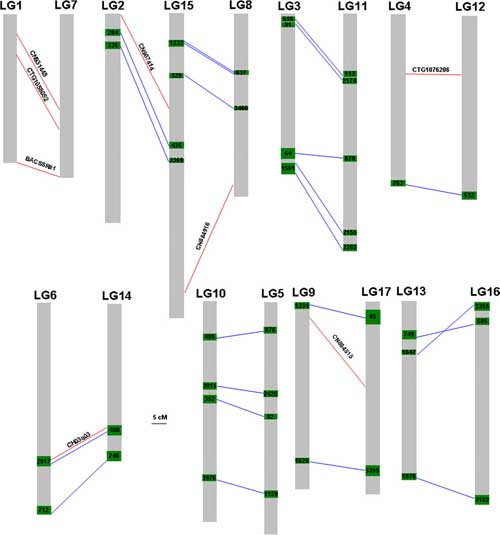Progress in Developing the Integrated Physical and Genetic Map of the Apple Genome
2011-07-13
Apple is one of the most important fruit crops in the world. A BAC-based physical map of the apple genome has been previously constructed based on fingerprinting analysis in 2007, and the next challenge is to anchor the physical map onto genetic linkage map. To achieve this goal, a high-density genetic map is essential for generating such an integrated physical and genetic map. Such a genetic linkage map is not only useful for assigning loci to physical positions on chromosomes, but it can also reveal those duplicated areas of a genome. Segmental duplications are important in the structural evolution and functional diversity of plant and animal genomes.
Recently, a cooperation between Wuhan Botanical Garden and University of Illinois at Urbana-Champaign has been conducted and a total of 355 simple sequence repeat (SSR) markers have been developed based on expressed sequence tag (EST) and bacterial artificial chromosome (BAC)-end sequence databases. The newly developed SSR markers have been successfully used to construct an apple genetic linkage map. The linkage map spanned 1143 cM, with an average density of 2.5 cM per marker. Newly developed SSR markers along with 279 SSR markers previously published by the HiDRAS project were further used to integrate physical and genetic maps of the apple using a PCR-based BAC library screening approach. A total of 470 contigs were unambiguously anchored onto all 17 linkage groups of the apple genome, and 158 contigs contained two or more molecular markers. The genetically mapped contigs spanned ~421 Mb in cumulative physical length, representing 60.0% of the genome. The sizes of anchored contigs ranged from 97 kb to 4.0 Mb, with an average of 995 kb. The average physical length of anchored contigs on each linkage group was ~24.8 Mb, ranging from 17.0 Mb to 37.73 Mb. Using BAC DNA as templates, PCR screening of the BAC library amplified fragments of highly homologous sequences from homoeologous chromosomes. Upon integrating physical and genetic maps of the apple, the presence of not only homoeologous chromosome pairs, but also of multiple locus markers mapped to adjacent sites on the same chromosome was detected. These findings demonstrated the presence of both genome-wide and segmental duplications in the apple genome and provided further insights into the complex polyploid ancestral origin of the apple.
The paper entitled "Integration of physical and genetic maps in apple confirms whole- genome and segmental duplications in the apple genome" has been published in Journal of Experimental Botany (IF2010= 4.818; Top 10%)
